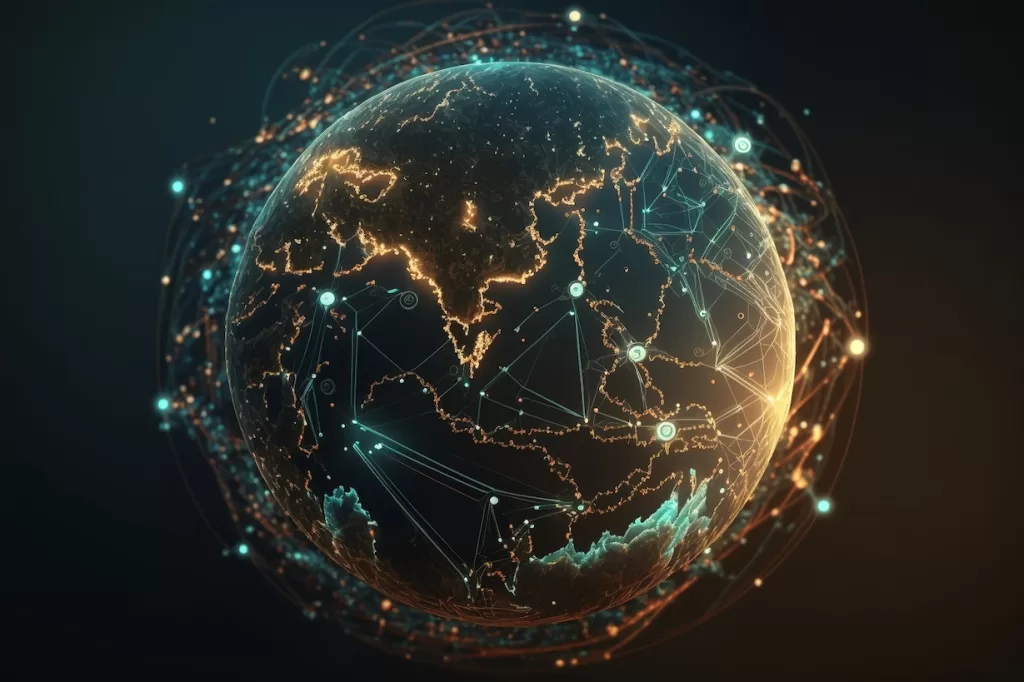Artificial Intelligence (AI) has become an indispensable component of the modern world, with its influence extending across various aspects of society, economy, and politics. This article explores the potential role of AI in geopolitics through real-world examples and relevant data, examining its impact on global power dynamics, international relations, and security concerns, while maintaining a balanced perspective on its potential benefits and challenges. This post combines two favourite topics of mine: AI and geopolitics. Let me know what you think below.

1. AI as a Driver of Economic Growth and Competitiveness
Countries investing in AI research and development are gaining a competitive edge in the global economy. For example, China’s commitment to becoming an AI superpower by 2030 has led to substantial government and private sector investments in the field. In the US, billions of investment has gone into generative AI and other AI technologies since chatGPT introduction about 6 months ago.
According to McKinsey Global Institute, AI has the potential to add up to $13 trillion to the global economy by 2030. While AI-driven innovation can lead to increased economic growth, it also raises concerns over potential monopolies, job displacement, and increased income inequality.
2. AI in Military and Security Applications
AI has been integrated into various military and security operations, ranging from autonomous weapon systems and surveillance to cyber warfare and intelligence analysis. The US military’s Project Maven, for instance, uses AI to analyze drone footage more effectively. These advancements present opportunities for enhanced defense capabilities and more efficient resource allocation. However, there is a risk of an AI arms race, and the potential misuse of AI-driven military technology could have severe consequences for global security.
3. AI and International Relations
AI-driven data analysis and predictions can provide valuable insights for policymakers, potentially improving diplomatic relations and international negotiations. The use of AI in predicting election outcomes, such as the 2016 US presidential election, has drawn attention to the power of AI in political forecasting. However, the rise of AI-powered disinformation and deepfake technologies poses a threat to international diplomacy and trust between nations. Balancing the benefits and risks of AI in this context will be essential for maintaining stability and promoting cooperation.
4. AI Ethics and Geopolitical Concerns
Ethical considerations surrounding AI development and deployment, such as algorithmic biases, privacy issues, and the potential for misuse, are shaping the geopolitical landscape. The Cambridge Analytica scandal revealed the dangers of using AI-driven data mining for political purposes, leading to increased scrutiny of technology companies and their role in the political process. Establishing global norms and regulations around AI technology will be crucial in addressing these concerns and ensuring that AI serves the greater good.
5. The Future of AI in Geopolitics
By 2030, AI is expected to contribute up to $15.7 trillion dollar to the global GDP, according to PwC. As breakthroughs emerge and new challenges and opportunities for international cooperation arise, AI will continue to play a significant role in geopolitics. Establishing global standards and regulations to ensure the responsible development and deployment of AI technology in the geopolitical context will be essential for harnessing its potential while mitigating its risks.
6. AI and Emerging Economies
Emerging economies face both opportunities and challenges in the AI landscape. India’s push for AI-driven innovation in healthcare, agriculture, and education sectors is a prime example of how AI can spur economic growth, bridge the digital divide, and promote sustainable development. However, AI-related dependencies on major powers may impact geopolitical relationships. Ensuring equitable access to AI technology and resources will be crucial for fostering inclusive growth and minimizing potential imbalances.
7. AI and the Global Workforce
According to the World Economic Forum, AI and automation could displace 85 million jobs by 2025, while also creating 97 million new roles. Immigration policies, international labor markets, and global competition for skilled workers will need to adapt to these changes to maintain social and economic stability. Policymakers must prioritize upskilling and reskilling programs to ensure a smooth transition to an AI-driven global workforce.
8. AI and the Environment
AI can help address environmental challenges, such as climate change, resource management, and disaster response. For example, AI-driven solutions like Google’s DeepMind have been used to optimize energy usage in data centers, reducing energy consumption by up to 40%. Collaborative efforts between nations in harnessing AI for environmental protection and sustainable development can shape geopolitical priorities and foster international cooperation. Ensuring responsible AI development and deployment is essential for minimizing potential negative environmental impacts and promoting equitable access to resources.
9. AI and Global Surveillance
AI-powered surveillance technologies have significant geopolitical implications, influencing the balance between national security and individual privacy. Promoting transparency and accountability in AI-driven surveillance will be crucial for maintaining trust and upholding human rights.
10. AI and the Future of Global Governance
AI has the potential to enhance global governance by improving decision-making processes in international organizations, such as the United Nations. Integrating AI into the global governance framework presents challenges, but a shared understanding of its benefits and limitations can lead to more effective and inclusive international cooperation.
11. AI and Soft Power
South Korea’s use of AI-driven technologies in its entertainment industry, such as the creation of virtual K-pop idols, demonstrates how AI can contribute to a nation’s geopolitical standing and influence international relations. Ensuring the ethical development and deployment of AI technologies is essential to maintain credibility and trust.
Conclusion
The role of AI in shaping modern geopolitics is multifaceted, with both significant potential benefits and challenges. By incorporating real-world examples, relevant data, and multiple viewpoints, we can better understand the complexities of AI in geopolitics. Establishing global standards and regulations, promoting international cooperation, and ensuring the responsible development and deployment of AI technologies are essential steps towards harnessing AI’s power for the benefit of all nations and peoples.
[jetpack_subscription_form]